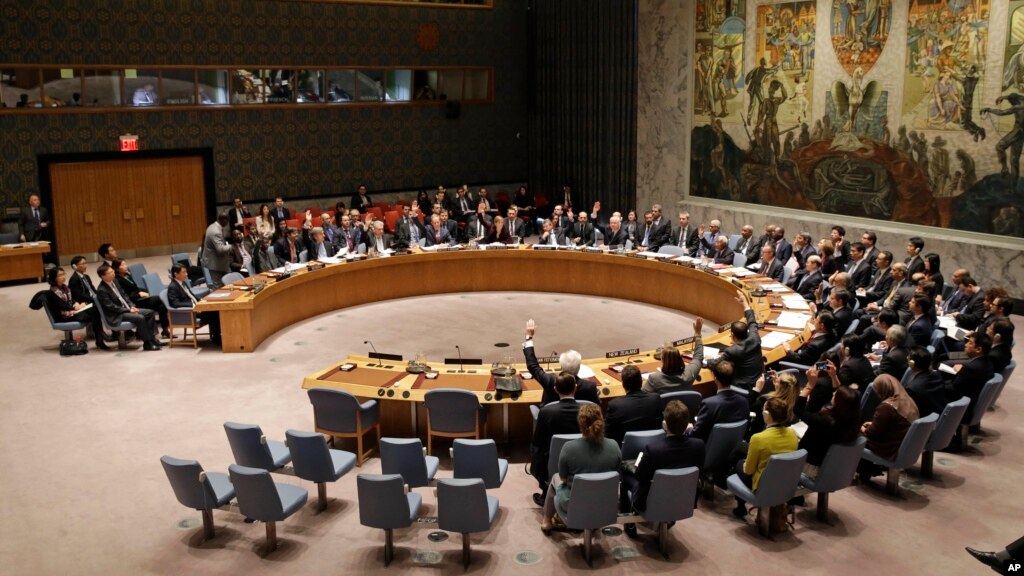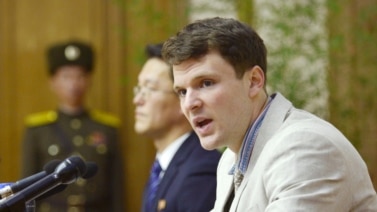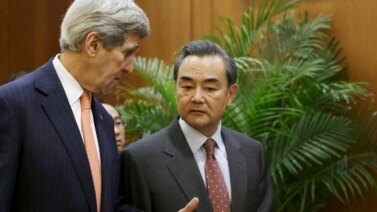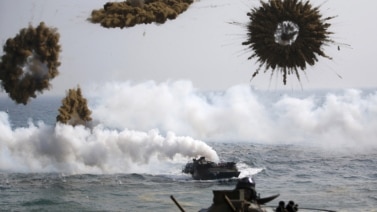
North Korea launched several short-range missiles from its eastern coast Thursday.
The action took place one day after the United Nations Security Council approved new sanctions against North Korea. U.N. members are seeking to punish North Korea for its nuclear and long-range missile tests earlier this year.
The South Korean Defense Ministry said it is investigating the incident. It is not clear how many missiles were fired.
U.S. officials say they are watching the situation closely.
The U.N. resolution had more than 50 co-sponsors. One measure put in place is the required inspection of all cargo going in and out of a community nation. There is also a total arms embargo including both conventional and other weapons. The resolution calls for restrictions on the sale of coal from North Korea, as well as other minerals, including gold, iron, iron ore and titanium.
An earlier ban on the sale or supply of aviation fuel to North Korea was revised. Aviation fuel can be used as rocket fuel. Russia urged that the measure be changed to permit fuel for passenger aircraft.
Banking sanctions also have been increased in addition to bans on the sale of luxury goods to North Korea. Travel bans and asset freezes also have been placed on 16 new individuals.
The vote on Wednesday came as the Security Council released a report on how North Korea has avoided international sanctions over ten years.
The report says the four rounds of increasingly strong U.N. measures imposed on North Korea since 2006 have not worked. It says sanctions have not persuaded the government of Kim Jong Un to stop its nuclear and ballistic missile programs.
The U.N. report documents a number of cases where North Korea has avoided sanctions. The report shows how the North continues to use the international financial system, airlines and container shipping routes to trade banned items.
Report discusses problems with current sanctions
A 2006 U.N. resolution requires member states to report all inspections of North Korean cargo if it is suspected of carrying arms, whether a violation is found or not. However, in the past 10 years only one member has filed a report.
Southeast Asia, Africa and the Middle East, the report notes, continue to sell banned North Korean military equipment. These include parts for unmanned aerial vehicles, or UAVs, and radar systems.
The U.N. contacted the government of Myanmar about the possible involvement of a Myanmar-based group in attempts to ship aluminum alloy parts to North Korea.
The aluminum rods can be used to make nuclear centrifuges. These were seized in Japan while being transported in 2012.
A number of companies identified
The Korea Mining Development Trading Corporation (KOMID) was identified in April 2009 as a main exporter of North Korean banned goods. These include equipment relating to ballistic missiles and conventional weapons.
But KOMID has been able to get around sanctions by using a different name and working though the Hong Kong shipping company Leader International.
The report says China-based Dalian Union International Trading took part in trade banned under U.N. sanctions. It says the company used a bank held by the Sunny International Development Company, registered in Hong Kong.
In 2015, Britain informed the panel about an attempt by North Korea to buy optical equipment for drones through companies based in China and registered in Hong Kong.
In 2014, the U.N. panel examined a North Korean drone that crashed on a South Korean border island. It said the drone was likely made by one of two Chinese companies.
Manufacturers in the Czech Republic and Canada also made parts used in the Chinese-made unmanned aerial vehicles, or UAVs.
An examination of the wreckage of a North Korean Unha-3 rocket launched in 2012 showed the involvement of a Taipei-based company, the Royal Team Corporation (RTC).
The report explained complicated payments used to get around sanctions. The U.N. panel found that North Korea tried to hide its banned dealings with RTC by sending payments through a third company that it paid to host a trade show.
The report reveals North Korean military ties with Uganda, Eritrea and Vietnam. However, the past evasions show the difficulty in placing sanctions on North Korea in many countries, including China, where enforcement has not been strong.
I’m Mario Ritter.
Brian Padden and Margaret Besheer reported this story from Seoul and Geneva. Mario Ritter adapted it for VOA Learning English.
Words in This Story
sponsors – n. a person or group who takes responsibility for something and supports it
conventional – adj. not nuclear
aviation – adj. having to do with aircraft
luxury – adj. expensive, having to do with comfort, ease or wealth
ballistic missile – n. a missile able to travel long distances across the earth
alloy – n. a mixture of metals
centrifuge – n. a machine used to separate substances
optical – adj. having to do with optics and vision, having to do with devices that use lenses or mirrors to produce images
evasion – n. to evade or avoid something


